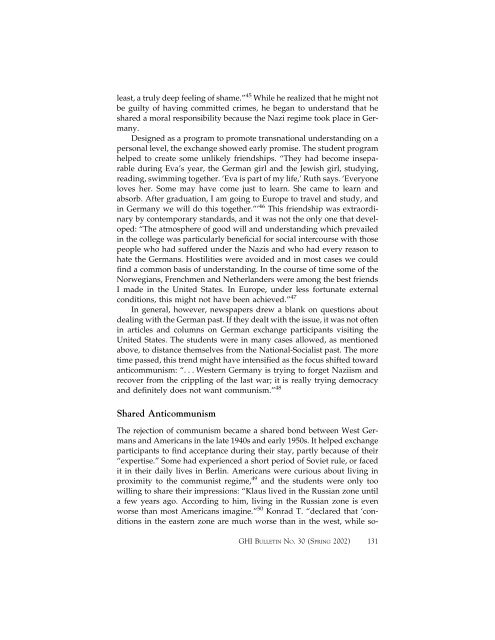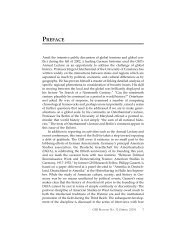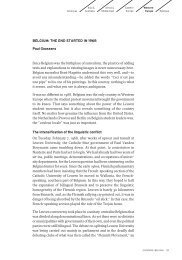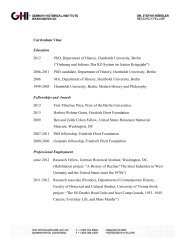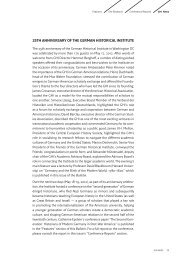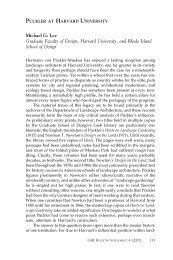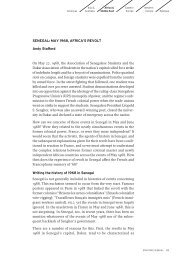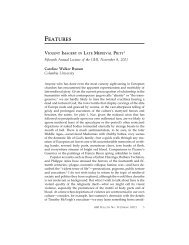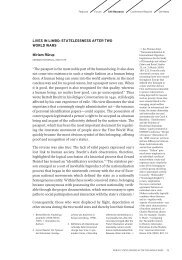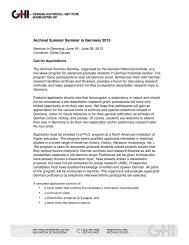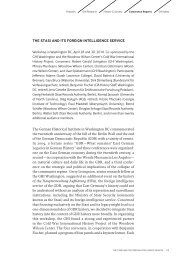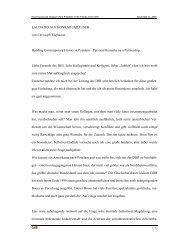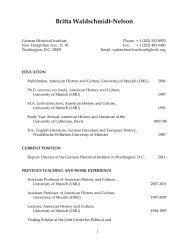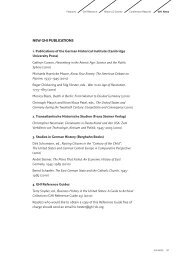German Student Exchange Programs in the United States, 1946-1952
German Student Exchange Programs in the United States, 1946-1952
German Student Exchange Programs in the United States, 1946-1952
Create successful ePaper yourself
Turn your PDF publications into a flip-book with our unique Google optimized e-Paper software.
least, a truly deep feel<strong>in</strong>g of shame.” 45 While he realized that he might not<br />
be guilty of hav<strong>in</strong>g committed crimes, he began to understand that he<br />
shared a moral responsibility because <strong>the</strong> Nazi regime took place <strong>in</strong> <strong>German</strong>y.<br />
Designed as a program to promote transnational understand<strong>in</strong>g on a<br />
personal level, <strong>the</strong> exchange showed early promise. The student program<br />
helped to create some unlikely friendships. “They had become <strong>in</strong>separable<br />
dur<strong>in</strong>g Eva’s year, <strong>the</strong> <strong>German</strong> girl and <strong>the</strong> Jewish girl, study<strong>in</strong>g,<br />
read<strong>in</strong>g, swimm<strong>in</strong>g toge<strong>the</strong>r. ‘Eva is part of my life,’ Ruth says. ‘Everyone<br />
loves her. Some may have come just to learn. She came to learn and<br />
absorb. After graduation, I am go<strong>in</strong>g to Europe to travel and study, and<br />
<strong>in</strong> <strong>German</strong>y we will do this toge<strong>the</strong>r.”’ 46 This friendship was extraord<strong>in</strong>ary<br />
by contemporary standards, and it was not <strong>the</strong> only one that developed:<br />
“The atmosphere of good will and understand<strong>in</strong>g which prevailed<br />
<strong>in</strong> <strong>the</strong> college was particularly beneficial for social <strong>in</strong>tercourse with those<br />
people who had suffered under <strong>the</strong> Nazis and who had every reason to<br />
hate <strong>the</strong> <strong>German</strong>s. Hostilities were avoided and <strong>in</strong> most cases we could<br />
f<strong>in</strong>d a common basis of understand<strong>in</strong>g. In <strong>the</strong> course of time some of <strong>the</strong><br />
Norwegians, Frenchmen and Ne<strong>the</strong>rlanders were among <strong>the</strong> best friends<br />
I made <strong>in</strong> <strong>the</strong> <strong>United</strong> <strong>States</strong>. In Europe, under less fortunate external<br />
conditions, this might not have been achieved.” 47<br />
In general, however, newspapers drew a blank on questions about<br />
deal<strong>in</strong>g with <strong>the</strong> <strong>German</strong> past. If <strong>the</strong>y dealt with <strong>the</strong> issue, it was not often<br />
<strong>in</strong> articles and columns on <strong>German</strong> exchange participants visit<strong>in</strong>g <strong>the</strong><br />
<strong>United</strong> <strong>States</strong>. The students were <strong>in</strong> many cases allowed, as mentioned<br />
above, to distance <strong>the</strong>mselves from <strong>the</strong> National-Socialist past. The more<br />
time passed, this trend might have <strong>in</strong>tensified as <strong>the</strong> focus shifted toward<br />
anticommunism: “. . . Western <strong>German</strong>y is try<strong>in</strong>g to forget Naziism and<br />
recover from <strong>the</strong> crippl<strong>in</strong>g of <strong>the</strong> last war; it is really try<strong>in</strong>g democracy<br />
and def<strong>in</strong>itely does not want communism.” 48<br />
Shared Anticommunism<br />
The rejection of communism became a shared bond between West <strong>German</strong>s<br />
and Americans <strong>in</strong> <strong>the</strong> late 1940s and early 1950s. It helped exchange<br />
participants to f<strong>in</strong>d acceptance dur<strong>in</strong>g <strong>the</strong>ir stay, partly because of <strong>the</strong>ir<br />
“expertise.” Some had experienced a short period of Soviet rule, or faced<br />
it <strong>in</strong> <strong>the</strong>ir daily lives <strong>in</strong> Berl<strong>in</strong>. Americans were curious about liv<strong>in</strong>g <strong>in</strong><br />
proximity to <strong>the</strong> communist regime, 49 and <strong>the</strong> students were only too<br />
will<strong>in</strong>g to share <strong>the</strong>ir impressions: “Klaus lived <strong>in</strong> <strong>the</strong> Russian zone until<br />
a few years ago. Accord<strong>in</strong>g to him, liv<strong>in</strong>g <strong>in</strong> <strong>the</strong> Russian zone is even<br />
worse than most Americans imag<strong>in</strong>e.” 50 Konrad T. “declared that ‘conditions<br />
<strong>in</strong> <strong>the</strong> eastern zone are much worse than <strong>in</strong> <strong>the</strong> west, while so-<br />
GHI BULLETIN NO. 30(SPRING 2002) 131


